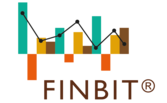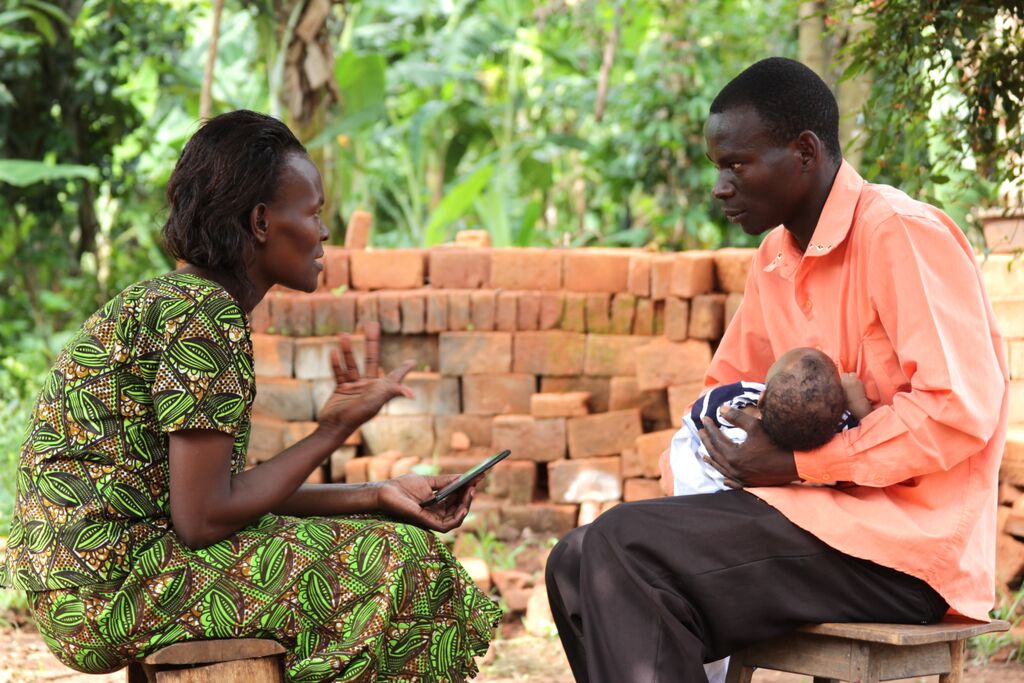“Yes, definitely” claims Anne Marie van Swinderen, founder of L-IFT, a company dedicated to exactly that – changing the world through diaries research.
“Diaries research” is a bit of a misnomer. It is not, as the name suggests, about people keeping diaries themselves, neither is it a daily thing. In L-IFT’s diaries a field-researcher pays a visit to a household and conducts an interview, every two weeks. This interview consists of “repeat questions” relating to subjects such as income, expenditures, usage of energy sources, health during pregnancy, so to observe patterns over time, and “occasional questions” which zoom every two weeks into a different theme, such as gender, agricultural skills, education, having children and getting married. Essential is to engage the same participant for half a year or longer.
So, how can diaries research change the world? Low-income people are still a mystery to governments and companies serving them. With mobile phones and digital money, we might superficially know what they are doing, but why they act in certain ways is a black box. Our diaries make people understood. “So we create an impact in several, interrelated ways”, says L-IFT. The L-IFT model is to regard three client types who each contribute and benefit.
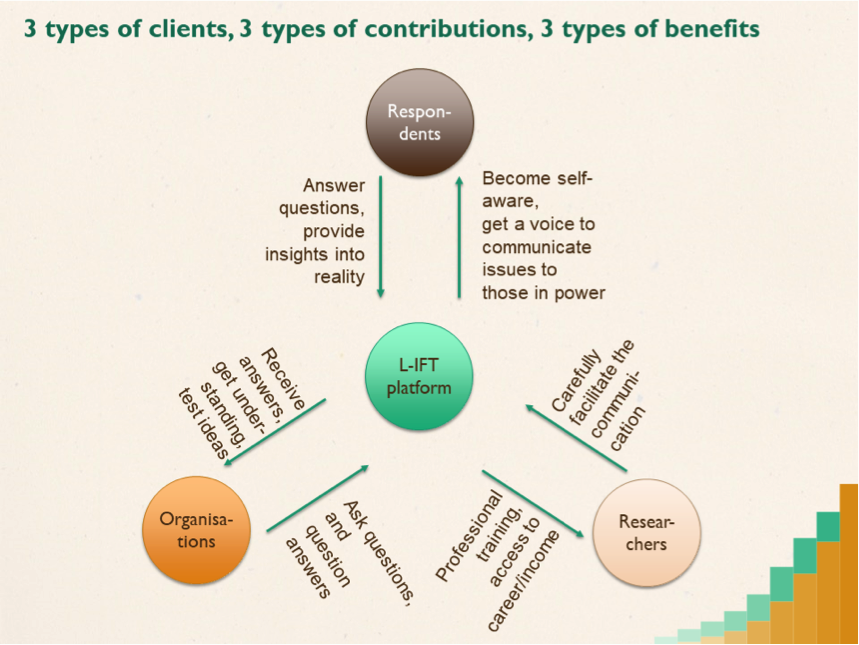
First of all, it gives people a voice. Especially to those who need it the most: vulnerable and marginalized groups. We make them feel heard. Through L-IFT’s diaries people from the ground influence policy. The intensive nature of these repeated interviews allows them to tell their story. At first, the questions may overwhelm, be misunderstood and respondents may not know the answer. As the research progresses, the participant and the researcher get to know each other, trust builds and respondents become more and more willing and able to share their lives. Along with this comes awareness about one’s own behavior. For instance, one participant told us she never realized how much time she spends on gathering firewood. She is now indignant about “so much wasted time, I now switched to charcoal. A small shopkeeper discovered through diaries that some part of her business actually made losses. We still have a way to go to make sure the diaries work for the participants and change the world into a world they need and want. Read more about participants’ learning in this MasterCard Foundation blog.
Secondly, it empowers and creates opportunities for young women. L-IFT’s field researchers are young, local people and the majority are women. For most of them, the diaries research is their first work experience. The work provides them with essential skills in listening to people, building empathy, and meanwhile getting deep experience of how people live. It is great preparation for any job or business where one has to deal with clients. L-IFT is now linking its 25 field researchers, who have just completed their 10 months of fieldwork, to work in microfinance, digital money, or selling solar. Wait for our upcoming blog about field research as professional training.
And finally, L-IFT’s diaries data is a treasure trove. As soon as the data has been collected, it is shared with the world through a user-friendly data portal. L-IFT’s current Financial and Energy Diaries in Uganda (FEDU) serves numerous solar companies, cook stove distributors, banks, and microfinance institutions with intricate information about their current and potential clients.
How do organizations make use of this “treasure trove”? Without having to leave their desks, institutions can now have a ”conversation” with real customers and get to really understand them. Let’s assume you are a bank and you recently launched a new service. How do you find out what people really think about it? Why they are using it? Why not? Or just: who is aware of it? You simply plug this question into L-IFT’s ongoing diaries. Six weeks later, the answer from 580 people arrive in your inbox, with all the rich context about each of these 580 people, how they grew up, when they had their first child, what their worst fears are, practically anything, but of course completely anonymous, not possible to trace to an individual. In August 2016 MTN and CBA launched MoKash, a digital savings and loans service. To find out the awareness of MoKash they preferred using L-IFT instead of classical market research. Roughly 5 weeks later they received some crucial feedback, namely that unusual suspects (poor, women, older) were more interested in the product but somehow failed to sign up.
Is LIFT another big data start-up, selling private information? Well, here we try to be very different. So far, research participants get as much as they give, without financial reward. The learning process and being part of a network, are considered good compensation. And L-IFT is working on respondents getting more out of it. We are obsessed with protecting their privacy and putting them in the driving seat of what will be communicated to the world.
So how will L-IFT then change the world? We believe that users should and can give shape to their services. For instance, BRAC in Uganda is becoming a deposit-taking institution. L-IFT wants to engage hundreds of Ugandan women to make suggestions for the new savings account, they themselves design their dream savings accounts.
What’s the way forward? The priority now is that L-IFT proves its model: can diaries be a business with paying customers (those using the data)? Can this seemingly costly quality approach be cost-recovery? Can customers share the platform? Do the researchers indeed gain skills with which to earn a good living? We will discuss these issues in the next blog. When these are confirmed, we will scale: tapping the full potential within the countries where we currently work and then covering more corners of the world. Our ultimate goal is to be up and running in 10 countries by the end of 2020.
But first, we need a starter grant to further test all the ideas. Is anybody out there hoarding some money they want to put to good use?
By Selin Holder
Communications and PR Officer
[Excerpt from WhatsApp group of Far East Researcher, Supervisor and L-IFT management:
5/2/17, 2:13 PM – Robert Wesonga:
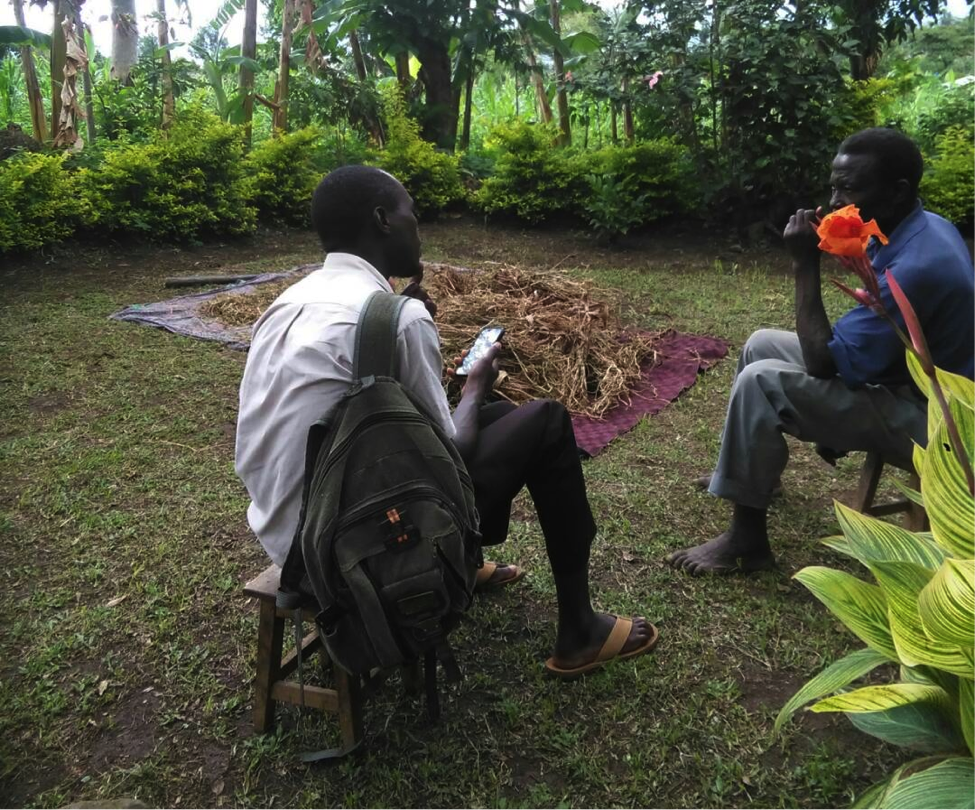
Musa interviewing Mr. Wilson who lives under that mountain he says he is so proud to be part of the respondents that were selected to be interviewed using the diaries.
5/2/17, 2:14 PM – Robert Wesonga: We are having shelter in his house chatting with him, he has good stories to listen too
5/2/17, 2:18 PM – Robert Wesonga:
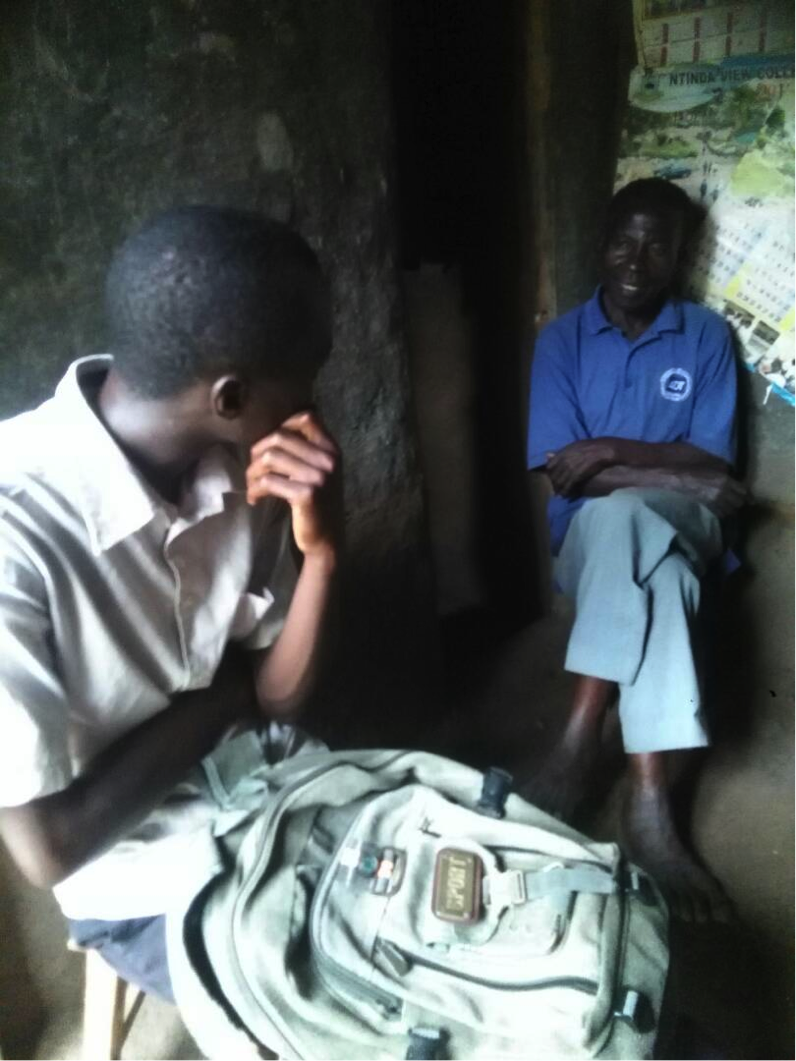
Musa is so attentive in listening to our host respondent.
5/2/17, 2:24 PM – Musa Mungoma: Whenever Robert visits, rain is part of us
5/2/17, 2:36 PM – Elizabeth Andera: It’s a blessing Musa.
5/2/17, 4:39 PM – Denis Malissa: Today I have worked on Robinah Wakha, Patrick Wweru, Nasike Merabu and Scovia Matuka.
